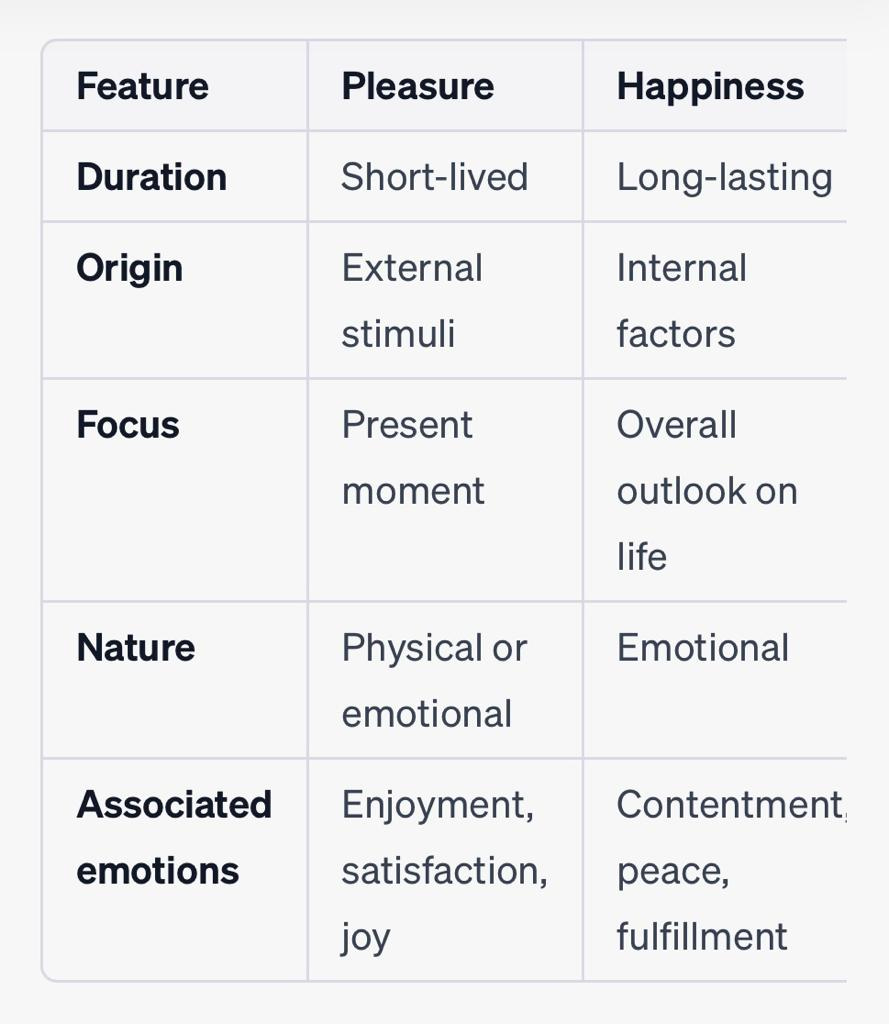Pleasure and Happiness: Beyond Pursuit, Embrace Every Moment.
Life isn't just the pursuit of happiness; it's about preserving precious, priceless moments.

Pleasure and Happiness: Subject of Philosophical Contemplation
In the intricate tapestry of India's philosophical heritage, the intertwining of pleasure and happiness has been a subject of deep reflection for multiple millennia. At the heart of this contemplation lies the timeless axiom, “Pleasure now, pain later. Or, pain now, pleasure later.” This unwavering principle has echoed through the teachings of our sages, poets, and thinkers across the ages— resonating even in the hearts of everyday individuals today.
Delineating Pleasure and Happiness
While many use the terms "pleasure" and "happiness" interchangeably, they encapsulate distinct emotions and experiences.
Pleasure provides an intense feeling of enjoyment, often short-lived and derived from external stimuli — be it the taste of a delectable dish, the strumming chords of a melody, or the intimate embrace of a loved one. It can be both physical or emotional but remains rooted in the immediacy of the present moment.
On the other hand, happiness carries with it a more profound state of well-being. It isn’t tethered to a particular event or sensation. Instead, it's an overarching sentiment spanning contentment, satisfaction, and joy, rooted in one's internal perceptions and lasting far longer than the fleeting moments of pleasure.
This delineation can be further understood through the following distinctions:
Towards a Holistic Life
To lead a holistic life, both pleasure and happiness play pivotal roles. Pleasure boosts our mood and offers immediate gratification. Still, its transient nature means it cannot be the foundational stone for sustained happiness. True happiness stems from within, drawing from our relationships, core values, and a purpose-driven life.
To amplify happiness, consider the following:
Cherish Relationships: Engage with loved ones. The bonds we foster are instrumental in predicting happiness.
Seek Purpose: A life with goals and aspirations offers depth, meaning, and direction.
Assist Others: Altruism not only impacts the world positively but uplifts our spirits.
Cultivate Gratitude: Daily gratitude practices help us focus on life's blessings.
Relish the Now: Dwelling in the past or excessive future planning can detract from today's joys. Remember, the quest for happiness is continuous. It requires introspection, action, and, at times, recalibration. Yet, the resulting life, steeped in joy and satisfaction, makes the journey worthwhile.

Shakespeare, in his wisdom, reminds us that sometimes, "The happier we, the less we perceive it," from "Much Ado About Nothing". Truly, the full weight of our joyful moments is often only felt in their absence or reflection.
Karma and The Bhagavad Gita
The aforementioned principle resonates profoundly with the teachings of the Bhagavad Gita. This revered scripture underscores that every action, every choice, has its eventual consequence. The allure of transient pleasures might bring immediate satisfaction, yet it may also sow the seeds of future discontent. Conversely, enduring today's challenges or forgoing fleeting pleasures can often pave the path for lasting happiness. This balance of choice and consequence is central to the concept of Karma.
Solitude and Loneliness
The distinction between “solitude” and “loneliness” is akin to that between pleasure and happiness. While pleasure might be sought in the company of others, happiness often finds its roots in the contentment of one’s solitude. Solitude is a conscious choice—a momentary retreat to reconnect with oneself. In contrast, loneliness emerges from a yearning for connection, a void. Being alone doesn't necessarily mean one is lonely. It's in those silent moments of solitude that profound realizations and contentment can arise.
The Sacred Verses: Sri Guru Granth Sahib on Bliss (“Anand”)
The sacred verses of the Sri Guru Granth Sahib offer insights into this spiritual journey:
ਅਨੰਦੁ ਭਇਆ ਮੇਰੀ ਮਾਏ ਸਤਿਗੁਰੂ ਮੈ ਪਾਇਆ ॥
(I am in bliss, O my mother, for I have found the True Guru.)
ਸਤਿਗੁਰੁ ਤ ਪਾਇਆ ਸਹਜ ਸੇਤੀ ਮਨਿ ਵਜੀਆ ਵਾਧਾਈਆ ॥
(I have found the True Guru, with intuitive ease, and my mind resounds with the melodies of bliss.)
Carpe Diem: Seize the Day
Life calls out to us, urging us to seize each moment, to dive deep into its myriad experiences without compromising our core. It isn’t about idly awaiting a distant promise or shunning worldly pleasures. Rather, it's about recognizing life's fleeting nature, treasuring the present, and finding a harmony that allows us to savor life’s joys without losing our true self.
In this endeavor to strike a balance between transient joy and enduring contentment, Shakespeare's wisdom from Much Ado About Nothing illuminates our path: "With mirth and laughter let old wrinkles come." Through jubilation and gaiety, we wholeheartedly welcome life's voyage. The challenge is to immerse ourselves into life, without allowing it to drown us.

PROLOGUE:
As I delve into this exploration, I find myself inevitably drawn to the rich tapestry of Indian cinema, which has, over the years, beautifully captured the nuances of pleasure, happiness, and the interplay between them. For the discerning reader keen on delving further, I leave you with three of my all-time favorite Hindi film masterpieces that echo this very theme. Each is a testament to the enduring wisdom of our culture and its portrayal on the silver screen. Enjoy, reflect, and immerse yourself in these cinematic gems.




